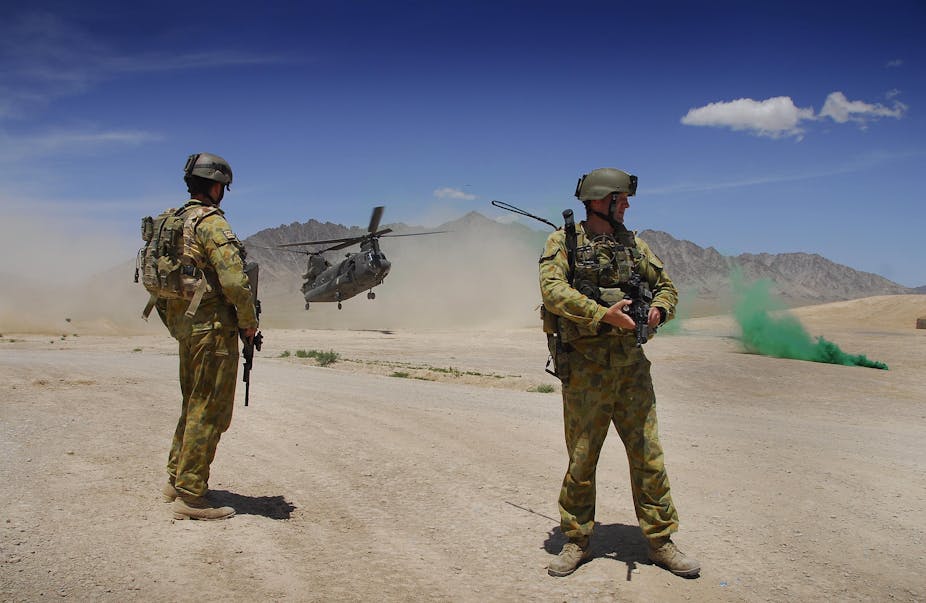The Australian Defence Force (ADF) has long been wary of the media’s power to derail its promotional narratives and damage careers in the process. But there was nothing irrational about its members’ determination to keep the fourth estate at bay in Afghanistan, Australia’s “longest war”. It was driven by what the ADF would argue was the evidence of history.
Writing in The Drum last month, the ABC’s defence correspondent Michael Brissenden ascribed the scant media coverage of Australia’s war in Afghanistan to the Australian Defence Force’s “irrational fear of the media”. But where did this fear begin, and what did the Australian media learn from the Afghanistan experience?
Lessons from Vietnam
While the Australian military’s aversion to the media has deep historical roots that one can trace back through both world wars, it was the conflict in Vietnam that entrenched its antagonism towards the fourth estate.
Like their colleagues in the US, the Australians were convinced that the media had lost them a war that the military had been poised to win. Specifically, they alleged that in turning domestic opinion against the conflict, the media had “maligned the troops after so wholeheartedly supporting them” and so played a central role in stirring up public resentment against them.
Australian war historian Jeffrey Grey has pointed out that these charges are groundless, a product of the Australian tendency to evaluate the experience of the Vietnam War as if it was identical to that of the US:
Our “memories” of the war are shaped and coloured by American responses to the American experience.

Contrary to the ADF’s accusations, the Australian media faithfully backed the military in Vietnam.
Australian reporters have, as journalist Tom Hyland notes, “created and sustained a consistently positive image of the ADF in action” and thereby “bestowed on the military a repository of enormous goodwill”. Despite this, by the end of the Vietnam War, distrust of and disdain for the media had soaked deep into the ADF’s cultural tissue and now comprised one of its key cultural norms.
The Afghanistan experience
Regular operational experience from Grenada in 1983 to the Balkans in 1999 brought the US military to the realisation that its hostility to the media was not only ill-founded but counter-productive. US commanders discovered that they needed the media to furnish a credible account of their deeds for a domestic audience and to project compelling images of US power to their adversaries. The media were not a threat to the military but an asset.
By contrast, until their deployment to Afghanistan, the ADF had few opportunities to revise their experiences of and review their relations with the media on operations. Consequently, the military arrived in Tarin Kowt with the old hostilities towards the media intact.
A recent working paper examining the experience of embedding reporters with the Australian military in Afghanistan published by the army’s think-tank, the Land Warfare Studies Centre, conceded that there was still an “institutional aversion to media” within the ADF and a “lingering bias” against its organisations and practitioners.
The fact that the ADF was in Uruzgan province in the first place, that its force strength was rarely greater than 1550 troops and the nature of the tasks it performed there further heightened the military’s sensitivity towards any media presence. What happened in Uruzgan was not central to the broader military outcomes of the struggle in Afghanistan. The war’s centres of gravity were further south, in Helmand and Kandahar, and further east on the border with Pakistan’s lawless frontier provinces.

While Special Forces flew in and out of Tarin Kowt targeting Taliban commanders and bomb makers, the bulk of the Australian troops were busy laying down infrastructure, capacity building and undertaking mentoring operations with the Afghan National Army’s frontline forces, preparing them to take over security in the province.
In this context, what the ADF’s personnel were doing in Afghanistan was less important than how they did it. While fulfilling their mission, their principal responsibility was not to the Afghans or the International Security Assistance Force, but to the history of the organisation they served. They had to be seen to be serving in the great traditions of their Anzac forebears.
As a result, the ADF regarded the media not as a link between the troops and the home front but as a potential threat to its reputation management strategies. As the war progressed, the troops were increasingly bemused by the lack of coverage of their deeds in Afghanistan and what they perceived as public indifference to the conflict.
While the media failed to commit the resources necessary to adequately cover the war, the greater responsibility for the lack of news from Afghanistan lies with the ADF and their political masters. Neither were prepared to risk the damage that bad news from the frontline might inflict.
Where politicians reacted by micromanaging the release of information and damming the flow of news from Afghanistan, the ADF’s response – for the greater part of the war – was to bring as much of the nomination, gathering and production of news about the war in-house, to control the media by taking over its role and functions.
As a consequence, despite the frustrations of its own personnel, the ADF would not tell. Despite the efforts of some dedicated reporters, the media could not tell. Ministers from both major parties refused to release information from Afghanistan and so the public never knew what was happening there.
If, as is now clear, Australia’s longest war has also been its worst reported, the key question for commentators and the public is less “why?” than “where to from here?”.
Kevin Foster’s new book, _Don’t Mention the War: The Australian Defence Force, the Media and the Afghan Conflict (Monash University Publishing), will be launched on December 5 by Jeff Sparrow._

